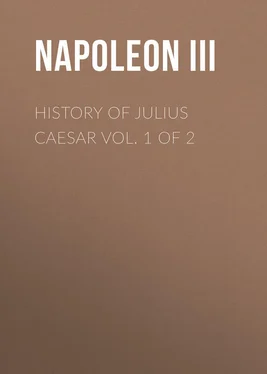Napoleon III - History of Julius Caesar Vol. 1 of 2
Здесь есть возможность читать онлайн «Napoleon III - History of Julius Caesar Vol. 1 of 2» — ознакомительный отрывок электронной книги совершенно бесплатно, а после прочтения отрывка купить полную версию. В некоторых случаях можно слушать аудио, скачать через торрент в формате fb2 и присутствует краткое содержание. Жанр: foreign_antique, foreign_prose, Биографии и Мемуары, на английском языке. Описание произведения, (предисловие) а так же отзывы посетителей доступны на портале библиотеки ЛибКат.
- Название:History of Julius Caesar Vol. 1 of 2
- Автор:
- Жанр:
- Год:неизвестен
- ISBN:нет данных
- Рейтинг книги:5 / 5. Голосов: 1
-
Избранное:Добавить в избранное
- Отзывы:
-
Ваша оценка:
- 100
- 1
- 2
- 3
- 4
- 5
History of Julius Caesar Vol. 1 of 2: краткое содержание, описание и аннотация
Предлагаем к чтению аннотацию, описание, краткое содержание или предисловие (зависит от того, что написал сам автор книги «History of Julius Caesar Vol. 1 of 2»). Если вы не нашли необходимую информацию о книге — напишите в комментариях, мы постараемся отыскать её.
History of Julius Caesar Vol. 1 of 2 — читать онлайн ознакомительный отрывок
Ниже представлен текст книги, разбитый по страницам. Система сохранения места последней прочитанной страницы, позволяет с удобством читать онлайн бесплатно книгу «History of Julius Caesar Vol. 1 of 2», без необходимости каждый раз заново искать на чём Вы остановились. Поставьте закладку, и сможете в любой момент перейти на страницу, на которой закончили чтение.
Интервал:
Закладка:
Distant commerce also employed numerous merchant vessels; the Mediterranean, like the Euphrates, was furrowed by barques which brought or carried merchandise of every description. Vessels sailing on the Erythræan Sea were in communication, by means of canals, with the shores of the Mediterranean. The great trade of Phœnicia with Spain and the West had ceased, but the navigation of the Euphrates and the Tigris replaced it for the transport of products, whether foreign or fabricated in Syria itself, and sent into Asia Minor, Greece, or Egypt. The empire of the Seleucidæ offered the spectacle of the ancient civilisation and luxury of Nineveh and Babylon, transformed by the genius of Greece.
Egypt.
XVI. Egypt, which Herodotus calls a present from the Nile, did not equal in surface a quarter of the empire of the Seleucidæ, but it formed a power much more compact. Its civilisation reached back more than three thousand years. The sciences and arts already flourished there, when Asia Minor, Greece, and Italy were still in a state of barbarism. The fertility of the valley of the Nile had permitted a numerous population to develop itself there to such a point, that under Amasis II., contemporary with Servius Tullius, twenty thousand cities were reckoned in it. 428The skilful administration of the first of the Lagides increased considerably the resources of the country. Under Ptolemy II., the annual revenues amounted to 14,800 talents (86,150,800 francs [£3,446,032]), and a million and a half of artabi 429of wheat. 430Besides the Egyptian revenues, the taxes levied in the foreign possessions reached the amount of about 10,000 talents a year. Cœle-Syria, Phœnicia, and Judea, with the province of Samaria, yielded annually to Ptolemy Euergetes 8,000 talents (46 millions and a half [£1,860,000]). 431A single feast cost Philadelphia 2,240 talents (more than 13 millions [more than half a million sterling]). 432The sums accumulated in the treasury amounted to the sum, perhaps exaggerated, of 740,000 talents (about 4 milliards 300 millions of francs [172 millions sterling]). 433In 527, Ptolemy Euergetes was able, without diminishing his resources too much, to send to the Rhodians 3,300 talents of silver, a thousand talents of copper, and ten millions of measures of wheat. 434The precious metals abounded in the empire of the Pharaohs, as is attested by the traces of mining operations now exhausted, and by the multitude of objects in gold contained in their tombs. Masters for some time of the Libanus, the kings of Egypt obtained from it timber for ship-building. These riches had accumulated especially at Alexandria, which became, after Carthage, towards the commencement of the seventh century of Rome, the first commercial city in the world. 435It was fifteen miles in circumference, had three spacious and commodious ports, which allowed the largest ships to anchor along the quay. 436There arrived the merchandises of India, Arabia, Ethiopia, and of the coast of Africa; some brought on the backs of camels, from Myos Hormos (to the north of Cosseïr), and then transported down the Nile; others came by canals from the bottom of the Gulf of Suez, or brought from the port of Berenice, on the Red Sea. 437The occupation of this sea by the Egyptians had put a stop to the piracies of the Arabs, 438and led to the establishment of numerous factories. India furnished spices, muslins, and dyes; Ethiopia, gold, ivory, and ebony; Arabia, perfumes. 439All these products were exchanged against those which came from the Pontus Euxinus and the Western Sea. The native manufacture of printed and embroidered tissues, and that of glass, assumed under the Ptolemies a new development. The objects exhumed from the tombs of this period, the paintings with which they are decorated, the allusions contained in the hieroglyphic texts and Greek papyrus, prove that the most varied descriptions of industry were exercised in the kingdom of the Pharaohs, and had attained a high degree of perfection. The excellence of the products and the delicacy of the work prove the intelligence of the workmen. Under Ptolemy II., the army was composed of 200,000 footmen, 40,000 cavalry, 300 elephants, and 200 chariots; the arsenals were capable of furnishing arms for 300,000 men. 440The Egyptian fleet, properly so called, consisted of a hundred and twelve vessels of the first class (from five to thirty ranges of oars), and two hundred and twenty-four of the second class, together with light craft; the king had, besides these, more than four thousand ships in the ports placed in subjection to him. 441It was especially after Alexander that the Egyptian navy became greatly extended.
Cyrenaica.
XVII. Separating Egypt from the possessions of Carthage, Cyrenaica ( the regency of Tripoli ), formerly colonised by the Greeks and independent, had fallen into the hands of the first of the Ptolemies. It possessed commercial and rich towns, and fertile plains; its cultivation extended even into the mountains; 442wine, oil, dates, saffron and different plants, such as the silphium ( laserpitium ), 443were the object of considerable traffic. 444The horses of Cyrenaica, which had all the lightness of the Arabian horses, were objects of research even in Greece, 445and the natives of Cyrene could make no more handsome present to Alexander than to send him three hundred of their coursers. 446Nevertheless, political revolutions had already struck at the ancient prosperity of the country, 447which previously formed, by its navigation, its commerce, and its arts, probably the finest of the colonies founded by the Greeks.
Cyprus.
XVIII. The numerous islands of the Mediterranean enjoyed equal prosperity. Cyprus, colonised by the Phœnicians, and subsequently by the Greeks, passing afterwards under the dominion of the Egyptians, had a population which preserved, from its native country, the love of commerce and distant voyages. Almost all its towns were situated on the sea-coast, and furnished with excellent ports. Ptolemy Soter maintained in it an army of 30,000 Egyptians. 448No country was richer in timber. Its fertility passed for being superior to that of Egypt. 449To its agricultural produce were added precious stones, mines of copper worked from an early period, 450and so rich, that this metal took its name from the island itself ( Cuprum ). In Cyprus were seen numerous sanctuaries, and especially the temple of Venus at Paphos, which contained a hundred altars. 451
Crete.
XIX. Crete, peopled by different races, had attained even in the heroic age a great celebrity; Homer sang its hundred cities; but during several centuries it had been on the decline. Without commerce, without a regular navy, without agriculture, it possessed little else than its fruits and woods, and the sterility which characterises it now had already commenced. Nevertheless, there is every reason to believe that at the time of the Roman conquest, the island was still well peopled. 452Devoted to piracy, 453and reduced to sell their services, the Cretans, celebrated as archers, fought as mercenaries in the armies of Syria, Macedonia, and Egypt. 454
Rhodes.
XX. If Crete was in decline, Rhodes, on the contrary, was extending its commerce, which took gradually the place of that of the maritime towns of Ionia and Caria. Already inhabited, in the time of Homer, by a numerous population, and containing three important towns, Lindos, Ialysus, and Camirus, 455the isle was, in the fifth century of Rome, the first maritime power after Carthage. The town of Rhodes, built during the war of the Peloponnesus (346), had, like the Punic city, two ports, one for merchant vessels, the other for ships of war. The right of anchorage produced a revenue of a million of drachmas a year. 456The Rhodians had founded colonies on different points of the Mediterranean shore, 457and entertained friendly relations with a great number of towns from which they received more than once succours and presents. 458They possessed upon the neighbouring Asiatic continent tributary towns, such as Caunus and Stratonicea, which paid them 120 talents (700,000 francs [£28,000]). The navigation of the Bosphorus, of which they strove to maintain the passage free, soon belonged to them almost exclusively. 459All the maritime commerce from the Nile to the Palus Mæotis thus fell into their hands. Laden with slaves, cattle, honey, wax, and salt meats, 460their ships went to fetch on the coast of the Cimmerian Bosphorus ( Sea of Azof ) the wheat then very celebrated, 461and to carry wines and oils to the northern coast of Asia Minor. By means of its fleets, though its land army was composed wholly of foreigners, 462Rhodes several times made war with success. She contended with Athens, especially from 397 to 399; she resisted victoriously, in 450, Demetrius Poliorcetes, and owed her safety to the respect of this prince for a magnificent painting of Ialysus, the work of Protogenes. 463During the campaigns of the Romans in Macedonia and Asia, she furnished them with considerable fleets. 464Her naval force was maintained until the civil war which followed the death of Cæsar, but was then annihilated.
Читать дальшеИнтервал:
Закладка:
Похожие книги на «History of Julius Caesar Vol. 1 of 2»
Представляем Вашему вниманию похожие книги на «History of Julius Caesar Vol. 1 of 2» списком для выбора. Мы отобрали схожую по названию и смыслу литературу в надежде предоставить читателям больше вариантов отыскать новые, интересные, ещё непрочитанные произведения.
Обсуждение, отзывы о книге «History of Julius Caesar Vol. 1 of 2» и просто собственные мнения читателей. Оставьте ваши комментарии, напишите, что Вы думаете о произведении, его смысле или главных героях. Укажите что конкретно понравилось, а что нет, и почему Вы так считаете.












